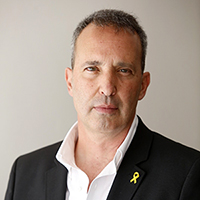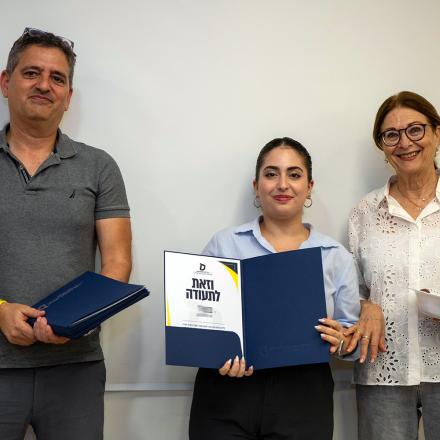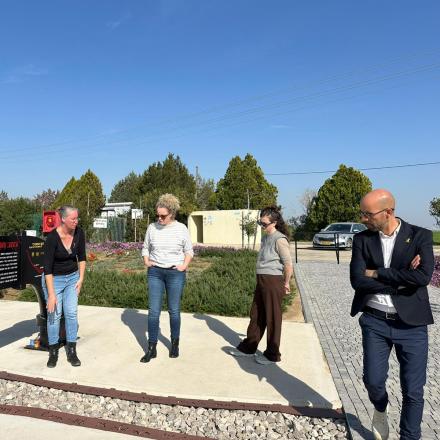
Prof. Nir Kedar looks pensive but determined as he surveys the human tragedy that has struck his college – and the unfathomable destruction of the surrounding communities it serves. Kedar – who assumed the presidency of Sapir Academic College just a year ago – suddenly finds himself in the eye of a maelstrom, leading a vital institution at the heart of the area most impacted by last week’s murderous onslaught.
“Our academic community is bloodied but not beaten,” explains Kedar, whose college is located adjacent to the town of Sderot, a stone’s throw from the border with Gaza. “Most of all, we’re acutely aware of our responsibility to help this long-suffering region of Israel rise up from the ashes.” Indeed, Sapir Academic College has taken losses that might have brought other institutions to their knees. The roster of those murdered includes seven members of faculty, administrative staff and one student. Kedar is stoney faced as he shares some of the names, but the anger in his voice is apparent. “Ofir Libstein, head of the Shaar Hanegev Regional Council and member of our Board of Trustees, killed in the battle to defend his kibbutz; Sivan Alkabetz a promising young student and her husband; Shlomi Matias – a beloved lecturer – and his wife; Ronit Sultan; Matti Weiss; Cindy and Yigal Flash; Yasmin Zohar; Yahav Weiner – all murdered in their homes.”
Sapir has become a widely recognized symbol of defiance. In an impassioned, joint appeal to the Minister of Education, Israel’s university presidents wrote: “Do you know that Sapir Academic College is on the verge of collapse due to the blows it has received, and that all of us are trying our best to help out?” Kedar is grateful for the solidarity of his colleagues but insists that “collapse” is out of the question. “Sapir is the largest employer in the Shaar Hanegev region, its social and intellectual nerve center and a critical engine of growth. We must pull ourselves together and lead the reconstruction effort.”
Kedar recalls the terrifying moments when the killing began. “I was abroad when I got word of what was happening. Just before I hopped on the first flight back to Israel, I called our security officer, instructed him to seal all the gates and lock himself inside the college ‘war room’ where we manage emergency situations. Since it was a holiday, the campus was largely empty at the time. But the grounds are littered with bullet cartridges and ordnance, testimony to the battle that raged all around us.” The human tragedy only became apparent in the ensuing days, he explains. “Over 2,500 of our students and faculty live in the Gaza Envelope region. Many of them have lost everything, their homes burned to the ground, clothing, belongings – nothing left.”
In a moment of bitterness, Kedar mentions his alma mater, Harvard University, where he earned a doctorate in law and legal history. “Frankly, I’m deeply pained by Harvard’s equivocal response to what happened. They’ve completely lost their moral compass. I feel betrayed.” He also harbors disappointment with Israel’s own government. “We’ve warned them over and over again, for twenty years we’ve demanded to know how they expect us to build an academic center under the constant threat of ballistic missiles.” His voice chokes momentarily as he adds “and now this. . .” But his tone quickly changes when he notes the outpouring of help and empathy from fellow Israelis. “At the end of the day, Israeli society is resilient. The Council for Higher Education has promised financial help to get us through the crisis. Other universities have offered housing and emotional help to our students. We’re all in this together.”
The road to recovery will be difficult for Sapir. Kedar foresees an initial drop-off in student enrollment and a major loss in revenue. But the psychic damage is his real concern. “Our community is traumatized. We’ve launched an emergency campaign to fund emotional and psychological intervention for those who need it, and we want to set up a permanent center for emotional support on campus. Everyone is hurting. Everyone is mourning friends, families and colleagues. There are, of course, the immediate, physical needs -- students who have lost everything they own, left penniless with just the shirts on their backs. We must help them get back on their feet. And we’re also assessing long-term needs. Housing for students in nearby kibbutzim has been destroyed. We must build a robust scholarship fund. It’s dizzying trying to take it all in.”
In the midst of all the suffering, Kedar strives to look forward, feet planted firmly on the ground. He plans to reopen the college in November. The campus remains off limits for security reasons, but he’s looking into distance learning or temporary study venues in other locations. “Sapir was hit hard but we’re still standing, and we must get up and running as soon as possible – not only for our own students, but for the sake of the entire Gaza envelope region. It’s the heart of our academic mission and our civic duty.”
More News

Law and the Holocaust

